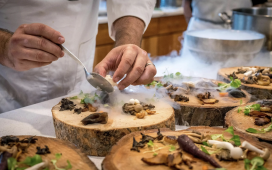Table Of Contents
You don’t have to enroll for cooking lessons to be a better cook. All you need to do is pay special attention to the little things that make a difference and better results. Here are 10 of the small suggestions from PREPARED COOKS you can do to improve your cooking.
1. Invest In A Good Knife
A knife is one of every chef’s best friends. Thus, it would be advisable to invest in a chefs knife you are comfortable with and one that fits your hands well. A good knife should not only have a good handle but sharp as well. Wide-bladed knives are mostly preferred for they offer more control, speed, and confidence when preparing your ingredients.
2. Look For The Best Quality Ingredients
Don’t go for the first cheese or onions you come across – pick out the best you can find. The best chocolate, for example, will make all the difference in your cake, and so are other ingredients. Pick your ingredients with care, going only for the best quality.
3. Use Your Hands
While a kitchen thermometer, knife, toothpick, or mixer may come in handy in food preparations, your hands are the best tools you can use. It’s only by using your hands that you will know the level of doneness your dough is, for example. If preparing meat, you can use your hands to check if it is well done or not. The meat will have a softer feel when it’s rare and firmer when done. Touching a pear makes it easier to tell if it is ripe or not.
4. Switch To Sea Or Kosher Salt
As mentioned before, always go for the best quality salt you can find. While ordinary table salt may serve the purpose, sea or kosher salt can be the difference between a tasty meal and a flat one. The same applies if you over or underuse the same. You might also want to crosscheck your ingredients if using another cook’s recipe.
5. Avoid Overcrowding Your Pan
This is particularly important when sautéing. The rule of thumb here is to ensure you can see the bottom of your pan with the ingredients in it. Having too much in the pan will only create lots of steam and lower the pan’s temperature. A cold pan means your good won’t brown or cook evenly. You also want to ensure your pan is already hot and that the ingredients are dry before tossing them in.
6. Concentrate Flavor By Reducing Liquids
Make a habit of using just enough liquids, mostly water, in your foods. Consider reducing the sauce even more when almost done cooking and about to serve. Doing so helps concentrate the flavors, hence a tastier meal. Reducing homemade stocks will help amplify the flavor too.
7. Allow A Few More Minutes When Baking Pie Or Tart Crusts
Although you might know this already, cooking pastry doughs for longer amplify their taste, leaving you with a tastier pie or tart. That said, consider baking your pastry a bit longer than recommended to ensure sugars in the crust caramelize properly. Always go for a brown crust, not blond.
8. Let Your Roasted Meats Rest Before Carving
Letting roasted meats rest for at least 10 minutes allows its juices to redistribute, hence a soft and tastier cut.
9. Add a splash of citrus juice or vinegar when done preparing your meat or vegetable dish.
Adding the splash of acid to your fruit desserts will make them flavorful too.
10. Trust your instincts, not the timer buzzer
Most recipes will advise you to look for something specific, say ‘baked till golden brown’ or ‘reduced by half,’ and not always the time. For example, Ovens differ in specifications and efficiency; hence they might not cook within the time given on paper. Consistency, color, and doneness will, however, always remain the same.





